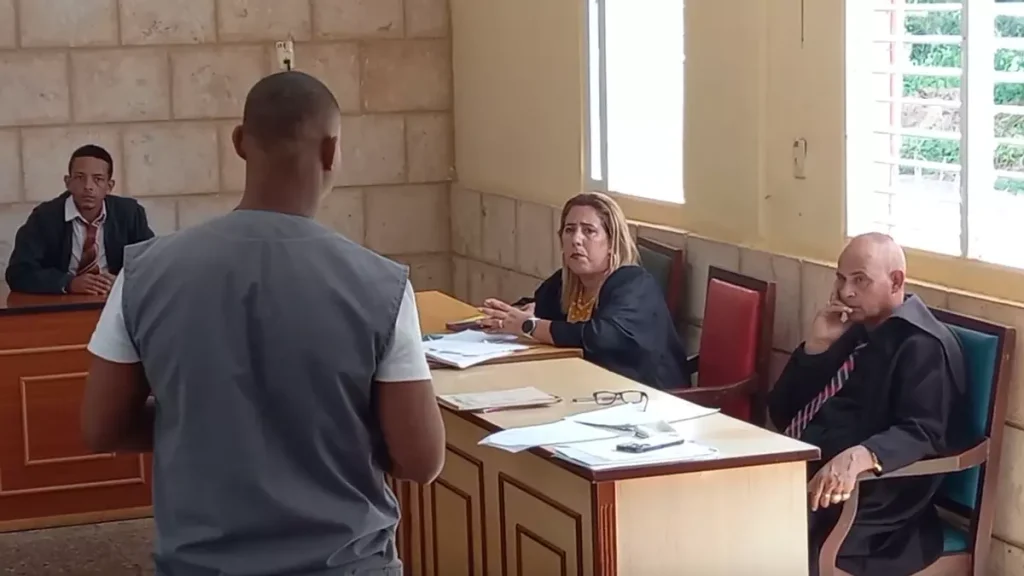The court held an “exemplary” trial in which it was proved that the defendants had “a purpose to illegitimately increase their personal assets”

![]() 14ymedio, Madrid, October 6, 2025 — A court in Artemisa has handed down sentences of seven and eight years’ imprisonment for two persons accused of theft and illegal slaughter of livestock. The trial was held on September 26, although it wasn’t broadcast on local television until this weekend.
14ymedio, Madrid, October 6, 2025 — A court in Artemisa has handed down sentences of seven and eight years’ imprisonment for two persons accused of theft and illegal slaughter of livestock. The trial was held on September 26, although it wasn’t broadcast on local television until this weekend.
According to the report, “it was proved that the accused, in order to illegitimately increase their personal assets through the sale of illegally slaughtered cattle meat, appeared in the immediate vicinity of the road to the Carranza estate, municipality of Mariel, province of Artemisa, and took possession of an animal of the Brown Swiss breed belonging to someone else and killed it without being authorized.”
In addition to deprivation of liberty, both will have to pay an unspecified fine for civil liability. The tools used in the commission of the crime, which were not detailed either, were confiscated, and, as normally happens, they will not be allowed to leave the country.
In addition to deprivation of liberty, both will have to pay an unspecified fine for civil liability. The tools used in the commission of the crime were also confiscated.
The report states that “their social behavior, its characteristics and the injuriousness of their actions” were taken into account when imposing the sentence, but the long length of the sentences is not the only element which suggests that there was an exemplary purpose to the trial. The written indication was on the page of Artemisa television in its social media, which used the word “exemplary” as the title of the video.
“Why doesn’t it say that the lawyer asked a question to the head of Sector and never got it answered because he did not have an answer to the relevant questions? Odor tests were not done in the proper manner and have no value under State law codes. It was all a farce set up by the head of sector. The injustice continues in condemning Julio César, 26 years old,” writes a user on social networks. “How can you publish this and not the questions that the police asked? Because those journalists who were in the courtroom didn’t ask them,” he continued, upset.
Cases of theft and slaughter of cattle are a headache for the Cuban authorities, in a context of beef shortages that have lasted for too many years. In recent times, moreover, with the increase of the economic crisis and the emergence of crimes, there have been countless robberies of this type. The ranchers declare themselves powerless, because they lack, among other things, such basic things for the protection of animals as wire fencing and personnel to guard them.
The harsh sentences surpass one of this year’s most prominent cases, when last April a man who stole two horses in San Antonio del Sur in Guantánamo in April was sentenced to three years in prison.
The harsh sentences surpass one of this year’s most prominent cases, when last April a man who stole two horses in San Antonio del Sur was sentenced to three years in prison
In February, after ten months of inspections and monitoring, the Ministry of Agriculture revealed that there are 2,914,009 cows left in the country, an alarming figure that is a measure of the livestock debacle in a country with six million head in 1958, as many as its inhabitants.
In addition to the crimes of theft and slaughter, there are other illegalities linked to the sector, such as births that are not declared, changing the declared sex of animals to avoid obligations with the State and a multitude of traps that have been consolidated over decades by the demands of authorities that have only led to an absolute crisis of the livestock population.
Translated by Regina Anavy
____________
COLLABORATE WITH OUR WORK: The 14ymedio team is committed to practicing serious journalism that reflects Cuba’s reality in all its depth. Thank you for joining us on this long journey. We invite you to continue supporting us by becoming a member of 14ymedio now. Together we can continue transforming journalism in Cuba.
